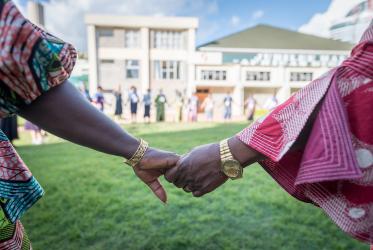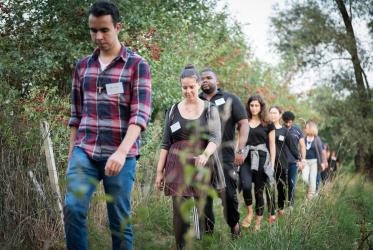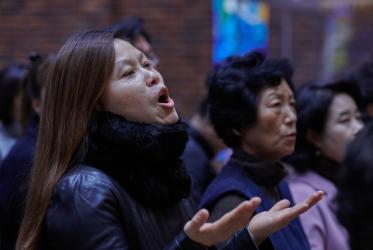Pope Francis and leaders of the World Council of Churches (WCC) exchanged gifts at a simple open-air ceremony in the garden of the WCC’s Ecumenical Institute at Bossey near Geneva, during the pontiff’s one-day visit to Switzerland to celebrate the WCC’s 70th anniversary.
Accompanied by a small group of WCC and Vatican representatives, WCC general secretary Rev. Dr Olav Fykse Tveit and Pope Francis each shared sculptures that symbolized the need to include people who often find themselves marginalized from society.
The Ecumenical Institute is located in the Chateau of Bossey, just over 20 kilometres (about 12 miles) from Geneva. It was founded as a centre for ecumenical education and training in 1946 amid preparations for the formal establishment of the WCC two years later.
Tveit presented Pope Francis with a carved wooden cross sculpted for the pontiff’s visit by Karim Okiki, a 33-year-old deaf man from Kenya. Three disability symbols carved on the cross represent blind or visually impaired, physically impaired and deaf people.
The cross is also includes the sign language symbol for the inclusion of persons with disabilities in all aspects of the church and the society. The symbol is not at “the margins but at the centre,” Tveit said as he showed Pope Francis the wooden cross.
In return, Pope Francis offered the WCC a sculpture for the chapel in the Ecumenical Centre and called “Crucifixion.” It was produced in 1990 by internationally renowned sculptor Alberto Ghinzani from Pavia in Italy. Made from a single piece of bronze, the sculpture appears to be a representation of a crucified Jesus but on closer examination depicts a figure distraught with pain without a beard or a crown of thorns.
The Vatican said the sculpture alludes to slavery, physical and moral exploitation, and expresses the hope of Pope Francis that all “should make an effort to rescue the marginalized from the drift of misery so as to restore them to their true dignity.”
The visit to Bossey, where Pope Francis had lunch with WCC leaders before the exchange of gifts, was the pontiff’s only stop outside Geneva.
The Ecumenical Institute has long been an area for cooperation between the WCC and the Roman Catholic Church, which is not a WCC member but collaborates in various projects. Its current academic dean is the Rev. Dr Lawrence Iwuamadi, a Roman Catholic priest from Nigeria.
The institute’s director, Fr Ioan Sauca, an Orthodox priest from Romania and deputy general secretary of the WCC, presented Pope Francis with a reproduction of an icon that hangs at the entrance to Bossey.
The icon is seen as the symbol of Bossey and depicts the universal Christ bringing the whole of the world and creation to unity, across different cultures, nations and ages.
Pope Francis offered Bossey a framed medal of his Apostolic Journey to Geneva, which depicts his papal emblem and the Château de Bossey.
During the ceremony, Tveit presented Pope Francis with two water bottles symbolizing the decision of the WCC to join the Blue Communities Project, which promotes water as a human right, rejecting the use of bottled water in places were tap water is safe.
“We do not use plastic and we use the water from tap,” Tveit said as he offered the bottles to Pope Francis, who has made protection of the environment a central priority of his papacy.
Learn more about the unique sculpture given by Pope Francis to the WCC
See Vatican coverage of the pope’s visit to Bossey






